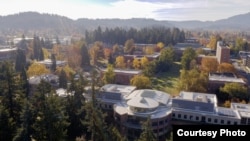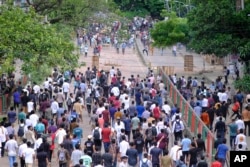Student Union
- By Pete Musto
Think Your English Skills Aren't Good Enough for Study in the US?
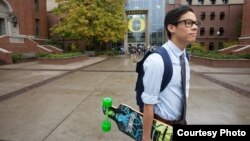
Many students who want to study in the U.S. say they have little chance of admission to an American college or university because of weak English skills.
But what if that barrier was removed from the application process?
It's called conditional admission, and could pave the way for foreign students seeking an American higher education, says Rob Hardin. Hardin is the senior assistant director for international student recruitment at the University of Oregon in Eugene.
Many schools understand that some of the best students in the world may not speak English well. Over the past decade, more schools are using conditional admissions to help these students.
"It adds significant value to have a student from Beijing, a student from Hanoi, a student from London in the classroom with the student from Portland, Oregon," Hardin told VOA. "We think that enhances the student from Portland, Oregon's experience."
At the University of Oregon, international students apply as any other student would, providing grades, extracurricular activities, Test of English as a Foreign Language (TOEFL) scores, and other information.
While many colleges and universities reject applicants with low TOEFL scores, other schools are willing to take a deeper look, Hardin says.
If the University of Oregon thinks an applicant has other attributes that make up for a lack of language skills, it will accept them into a special program, according to Hardin.
The conditional-admission program teaches in seven levels of progressive English. As the student's knowledge increases, their test scores improve.
Hardin says many international students prefer to study English in their native countries to save money and be closer to home, until they can test into a traditional degree program.
But schools like the University of Oregon that offer conditional admissions start students on their degree program once they complete the highest level of the language program.
These conditional admissions programs help students get used to the American college experience. Cultural differences in teaching styles between school back home and school in the U.S. can be addressed. Also, while living on an American college campus, surrounded by English speakers, students often improve their language skills faster.
"You're going to have to figure out how to go to the grocery store and buy apples," Hardin said. "You're going to take what you're learning in the classroom and you're going to be able to immediately apply it to your daily life."
Hardin notes that this newer path to admission is not just for students with weak English-language skills. Even strong applicants may not realize that they lack the English abilities to fully succeed at the college level.
For students who need additional support, some schools offer a bridge program. At the University of Oregon, students in the bridge program take as many as six additional English classes, often related to subjects the students are taking.
International students should not expect every college and university in the U.S. to offer such programs. At top schools, competition is fierce and students who are already strong in English have a better chance at acceptance.
Have you not applied because you think your English skills aren't good enough? Tell us about it in the comments, and on our Facebook, Twitter, Instagram and LinkedIn, thanks!
See all News Updates of the Day
Tips for first-year international students in the US
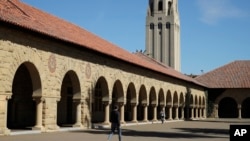
Book your flights right away, get a U.S. phone plan, make sure you have linens for your dorm and attend orientation – that’s some of the advice international students have for first-year college students coming from abroad.
U.S. News & World Report compiled helpful tips for students studying in the United States for the first time. (July 2024)
Survey: Social integration, career prep are important to international students
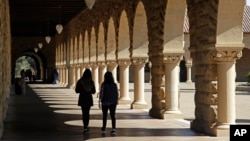
A recent survey of international students in the United States found that before starting school, they were concerned about personal safety, making friends and feeling homesick.
Inside Higher Ed reports that international students want specialized orientations, peer connections, career preparation and job placement to help make their college experiences successful. (July 2024)
US advisory council ends Nigeria visit, signs student exchange deal
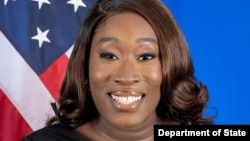
Members of a U.S. presidential advisory council have approved a student exchange deal between an American college and a Nigerian university as part of the council's effort to strengthen collaboration on education, health, entrepreneurship and development between Africa and Africans living abroad.
The council also visited a health facility supported by the United States Agency for International Development in the capital.
Nigerian authorities and visitors chatted with members of the U.S President's Advisory Council on African Diaspora Engagement as they toured a healthcare facility in Karu, a suburb of Abuja, on the last day of the council's three-day visit to Abuja and Lagos.
The facility is one of many supported by the United States Agency for International Development, or USAID, to improve the management of childhood illnesses, family planning, immunization and delivery.
The tour was part of the council's effort to promote African diaspora-led investments in technology entrepreneurship, education and healthcare delivery.
"They're doing a phenomenal job there, it really gave us a sense of what the healthcare system is in Nigeria," said Deniece Laurent-Mantey, executive director of the advisory council. "This is our first trip as a council to the continent and we chose Nigeria for a reason — the diaspora in Nigeria is very active, very influential, and they're really a source of strength when it comes to our U.S.-Africa policy. And so for us coming to Nigeria was very intentional."
The council was created by President Joe Biden in September to improve collaboration between Africa and its diaspora in terms of economic and social development.
Akila Udoji, manager of the Primary Healthcare Centre of Karu, said officials in Nigeria were pleased that the council members were able to visit.
"We're happy that they have seen what the money they have given to us to work with has been used to do, because they have been able to assist us in capacity-building, trainings, equipment supply and the makeover of the facility," Udoji said.
Earlier, the council signed a deal for a student exchange program between Spelman College in the southern U.S. city of Atlanta and Nigeria's University of Lagos.
Laurent-Mantey said education exchanges are one of the council's top priorities.
"In Lagos, we had the president of Spelman College — she's also a member of our council — she signed an agreement with the University of Lagos to further education exchange programs in STEM and creative industries between those two universities," Laurent-Mantey said. "And I think for us it's very important, because Spelman College is a historically Black university, and so here we are promoting the importance of collaboration between African Americans and Africans."
In March, the advisory council adopted its first set of recommendations for the U.S. president, including the student exchange initiative, advocating for more U.S. government support for Africa, climate-focused initiatives, and improving U.S. visa access for Africans.
The council met with Nigerian health and foreign affairs officials during the visit before leaving the country on Wednesday.
American Academy of the Arts College announces closure
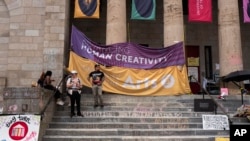
The American Academy of Art College in Chicago announced it would be closing after 101 years of preparing students for careers in art and illustration.
WTTW news reported that like other art colleges, the academy saw enrollment drop after the pandemic, and officials made the decision to close the college last month. (July 2024)
5 killed, dozens injured in clashes over Bangladesh jobs quota system

At least 5 people were killed and dozens injured in two separate incidents in Bangladesh as violence continued Tuesday on university campuses in the nation's capital and elsewhere over a government jobs quota system, local media reports said quoting officials.
At least three of the dead were students and one was a pedestrian, the media reports said. Another man who died in Dhaka remained unidentified.
The deaths were reported Tuesday after overnight violence at a public university near Bangladesh's capital, Dhaka. The violence involved members of a pro-government student body and other students, when police fired tear gas and charged the protesters with batons during the clashes, which spread at Jahangir Nagar University in Savar, outside Dhaka, according to students and authorities.
Protesters have been demanding an end to a quota reserved for family members of veterans who fought in Bangladesh's war of independence in 1971, which allows them to take up 30% of governmental jobs.
They argue that quota appointments are discriminatory and should be merit-based. Some said the current system benefits groups supporting Prime Minister Sheikh Hasina. Some Cabinet ministers criticized the protesters, saying they played on students' emotions.
The Bengali-language Prothom Alo daily newspaper reported that one person died in Dhaka and three others, including a pedestrian, were killed after they suffered injuries during violence in Chattogram, a southeastern district, on Tuesday.
Prothom Alo and other media reports also said that a 22-year-old protester died in the northern district of Rangpur.
Details of the casualties could not be confirmed immediately.
While job opportunities have expanded in Bangladesh's private sector, many find government jobs stable and lucrative. Each year, some 3,000 such jobs open up to nearly 400,000 graduates.
Hasina said Tuesday that war veterans — commonly known as "freedom fighters" — should receive the highest respect for their sacrifice in 1971 regardless of their current political ideologies.
"Abandoning the dream of their own life, leaving behind their families, parents and everything, they joined the war with whatever they had," she said during an event at her office in Dhaka.
Protesters gathered in front of the university's official residence of the vice chancellor early Tuesday when violence broke out. Demonstrators accused the Bangladesh Chhatra League, a student wing of Hasina's ruling Awami League party, of attacking their "peaceful protests." According to local media reports, police and the ruling party-backed student wing attacked the protesters.
But Abdullahil Kafi, a senior police official, told the country's leading English-language newspaper Daily Star that they fired tear gas and "blank rounds" as protesters attacked the police. He said up to 15 police officers were injured.
More than 50 people were treated at Enam Medical College Hospital near Jahangir Nagar University as the violence continued for hours, said Ali Bin Solaiman, a medical officer of the hospital. He said at least 30 of them suffered pellet wounds.
On Monday, violence also spread at Dhaka University, the country's leading public university, as clashes gripped the campus in the capital. More than 100 students were injured in the clashes, police said.
On Tuesday, protesters blocked railways and some highways across the country, and in Dhaka, they halted traffic in many areas as they vowed to continue demonstrating until the demands were met.
Local media said police forces were spread across the capital to safeguard the peace.
Swapon, a protester and student at Dhaka University who gave only his first name, said they want the "rational reformation of the quota scheme." He said that after studying for six years, if he can't find a job, "it will cause me and my family to suffer."
Protesters say they are apolitical, but leaders of the ruling parties accused the opposition of using the demonstrations for political gains.
A ruling party-backed student activist, who refused to give his name, told The Associated Press that the protesters with the help of "goons" of the opposition's Bangladesh Nationalist Party and Jamaat-e-Islami party vandalized their rooms at the student dormitories near the Curzon Hall of Dhaka University.
The family-of-the-veterans quota system was halted following a court order after mass student protests in 2018. But last month, Bangladesh's High Court nulled the decision to reinstate the system once more, angering scores of students and triggering protests.
Last week, the Supreme Court suspended the High Court's order for four weeks and the chief justice asked protesting students to return to their classes, saying the court would issue a decision in four weeks.
However, the protests have continued daily, halting traffic in Dhaka.
The quota system also reserves government jobs for women, disabled people and ethnic minority groups, but students have protested against only the veterans system.
Hasina maintained power in an election in January that was again boycotted by the country's main opposition party and its allies due to Hasina's refusal to step down and hand over power to a caretaker government to oversee the election.
Her party favors keeping the quota for the families of the 1971 war heroes after her Awami League party, under the leadership of her father, Sheikh Mujibur Rahman, led the independence war with the help of India. Rahman was assassinated along with most of his family members in a military coup in 1975.




